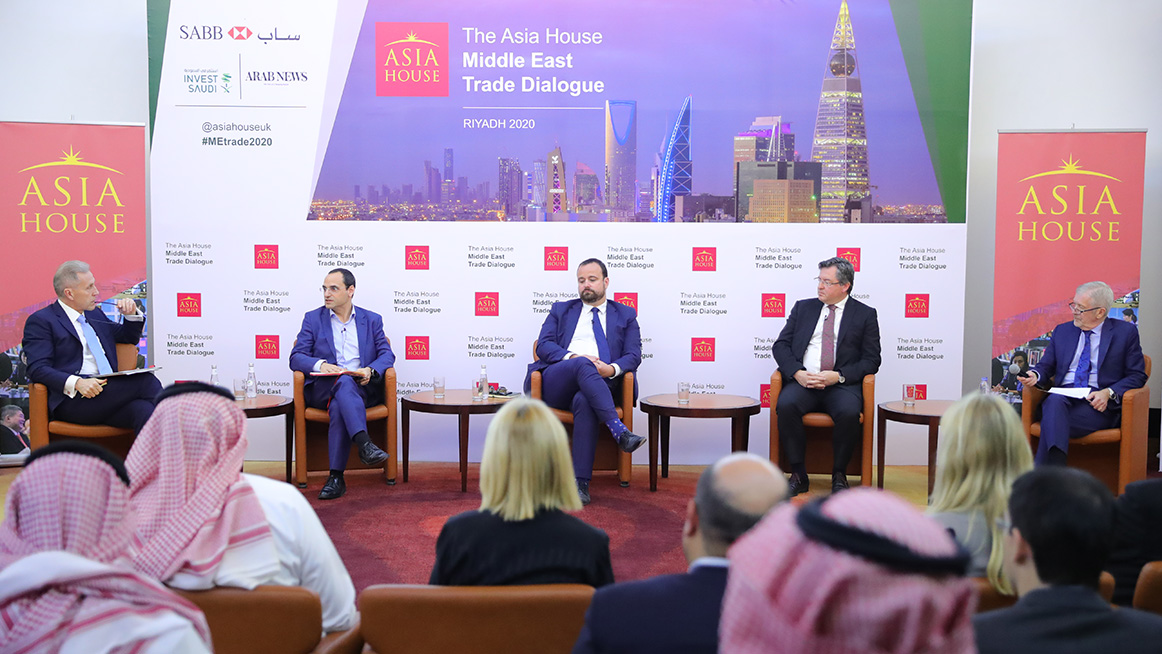Driving commercial and political engagement between Asia, the Middle East and Europe
Driving commercial and political engagement between Asia, the Middle East and Europe
Driving commercial and political engagement between Asia, the Middle East and Europe

With climate change emerging at the top of the global policy agenda, the shifts towards renewable energies and the investment implications this will herald was a focus at the Asia House Middle East Trade Dialogue in Riyadh.
The conference heard from key figures at the heart of trade and investment in the Middle East, including Frank Kane, Senior Business Columnist at Arab News, who shared insights on how climate change is driving the policy agenda.
“It was top of the agenda at Davos,” Frank said. “It was almost a climate change conference.”
However, the G20 Finance Leaders meeting, convened in Riyadh just days before the Asia House dialogue, saw climate change slip down the agenda amid disagreements on priorities and the emerging challenge of coronavirus, Frank said.
For Jose Maria-Ortiz, Managing Partner for EMEA, Palladium, “climate change is one of the underlying issues which will transform the global economy.”
“If we don’t adapt, the implication on the economy, on shops, on life, will be dramatic,” he added, highlighting the emphasis of sustainability in Saudi Arabia’s ambitious Vision2030 initiative.
However, Sylvain Cote, Senior Economist, Saudi Aramco, cautioned against some of the optimism around renewables, especially when it comes to job creation.
“There’s been a lot of talk about 100,000 jobs being created,” Sylvain said. “But when we look at the allocation of those jobs, we see that most of them will be in two phases in the life of that project – the construction phase and the operational and maintenance phase.”
Most of these jobs will be done by non-Saudi nationals, Sylvain said, meaning there will be limited opportunity to create renewable energy roles in the country.
There is, however, tremendous potential in the value chains that will rise around the renewable energy sector, he suggested.
If the fruits of the renewables revolution are to be realised in Saudi Arabia, there needs to be a policy rethink, Gregory Fayet, General Manager, EDF Energies Saudi Arabia, said.
Citing issues with the tendering process in the Kingdom, Fayat said “the only way to create a [renewables industry here] is through policy shifts.”
The discussion, chaired by Asia House Chief Executive Michael Lawrence, also explored some of the key issues shaping global energy markets, including oil prices.
For Frank, there are two parts to the story.
“The coronavirus outbreak has had a severe effect on the prospects for economic growth, and in turn that always affect oil prices,” Frank said. “But also, we may be seeing a weakness in the fundamental pricing structure of oil.” He said OPEC+ discussions on extending pricing cuts were failing to have an impact, suggesting a ground shift in the sector.
“Some oil analysts think we’re on the verge of a new era, where the orthodox way of looking at oil price cutting will no longer have the effect that it used to,” he said.
